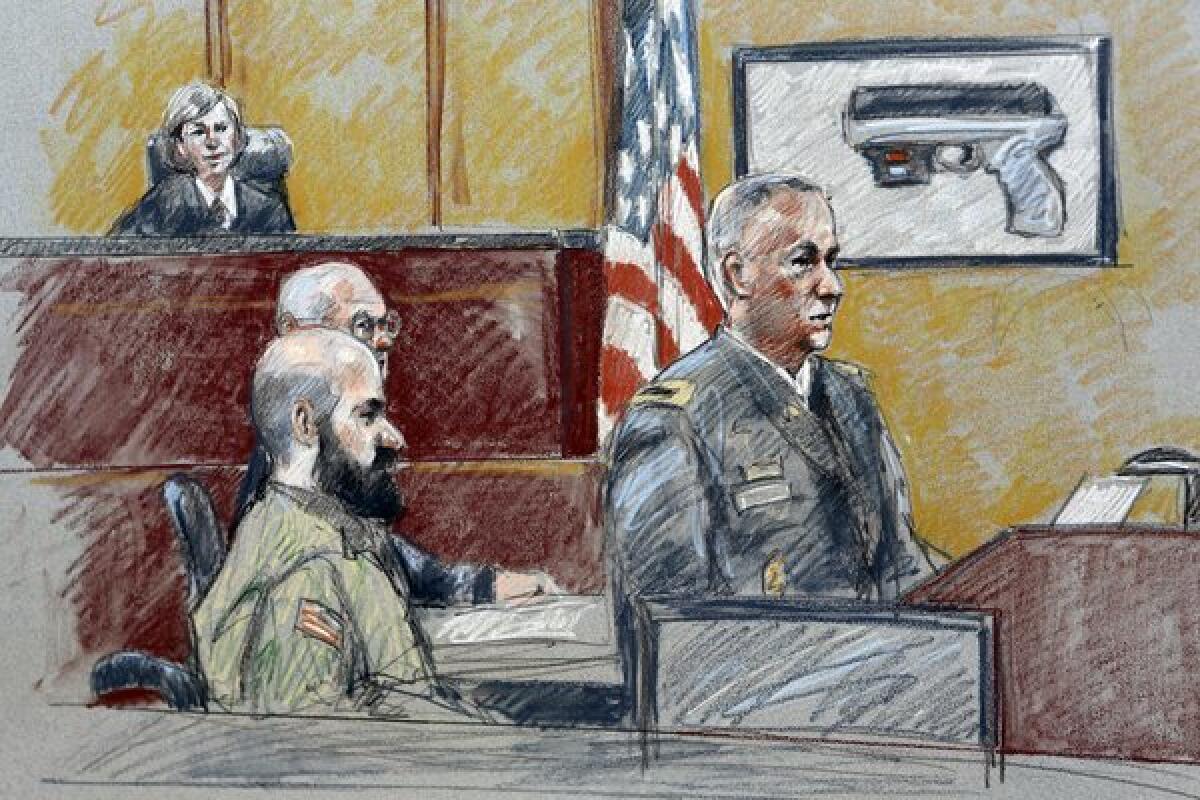Ft. Hood testimony: ‘We began to blindly exchange fire’

- Share via
FT. HOOD, Texas — Police officer Kimberly Munley watched in court Friday as a dashboard camera video showed her responding to the mass shooting at this central Texas Army base four years ago.
On the courtroom’s flat-screen television monitor, soldiers are seen running across the street in front of her car, apparently fleeing.
“I need more units,” a woman’s voice can be heard saying as Munley arrives at a medical processing center and runs from her car as shots sound in the distance.
Soon after, Munley, a sergeant, said she confronted the shooter, trading gunfire before she was shot three times.
With Munley’s testimony Friday the long-delayed court martial of accused shooter Maj. Nidal Malik Hasan appeared to be drawing to a close.
Hasan, 42, an American-born Muslim, faces 13 charges of premeditated murder and 32 charges of attempted premeditated murder in connection with the shooting on Nov. 5, 2009. If convicted, the Army psychiatrist could be sentenced to death by the military jury of 13 officers, all of his rank or higher.
Prosecutors have spent the last eight days building their case, mostly chronologically, through testimony from more than 75 witnesses.
Hasan’s neighbors and colleagues told jurors about what they observed in the days and hours leading up to the shooting, how he spoke at morning prayers and gave away belongings. Victims testified about being shot, seeing fellow soldiers bloodied, wounded and dying. Forensic experts detailed the aftermath, how soldiers were shot again as they lay wounded, one a dozen times. Ballistics experts testified Friday about how they recovered two handguns, two extended magazines and 76 spent shell casings from the scene.
On Friday, Munley, who flew in to testify from Kure Beach, N.C., described how she and fellow Sgt. Mark Todd stopped the shooter.
As she ran toward the sound of gunfire, Munley said she saw the uniformed Army officer firing, heard Todd shout for him to drop his weapon, and then started taking fire.
“I saw a flash, a red laser cross my eyes,” she said, referring to one of two colored lasers Hasan had allegedly attached to his gun.
Munley backed up, moving to another corner of the building where she said the shooter again approached within eight feet and “we began to blindly exchange fire.”
Bullets struck Munley in her right hand, left thigh and left kneecap, and she fell.
As she lay on the ground, the shooter fast approaching, her handgun jammed.
“I saw him standing over me, trying to fire,” she said of the shooter.
But his gun had jammed, too. As he ran off to fix it, Munley said, the shooter again encountered Todd, who shot and wounded him.
Hasan remains paralyzed from the chest down, confined to a wheelchair where he sat in court Friday, stroking the beard he has fought to keep for religious reasons in violation of Army regulations.
Munley mostly ignored Hasan in court. During less than half an hour on the stand, she locked eyes with him only once, then looked away. Hasan remained impassive, and they did not interact as Munley left court, walking with a slight limp.
Following testimony Friday, the military judge, Col. Tara Osborn, considered several requests outside the presence of the jury.
She denied a request by the civil attorney representing victims of the attack that would have allowed them to speak publicly after testifying. Osborn has been warning witnesses after they testify not to speak out until after the court-martial ends, and she reiterated that warning on Friday, saying she is trying to protect the integrity of future witnesses and the high-profile case. The judge has refused, however, to issue a gag order on Hasan, who has released documents to the media through his former civilian lawyer, John Galligan.
Osborn also denied a request by lawyers to intervene in the case on behalf of Tim Jon Semmerling, a legal specialist who has been advising Hasan for the last three years but is also involved in other cases that might be influenced by or have influence on Hasan’s case.
Hasan said he wanted to remove the defense mitigation specialist from his witness list, making the request moot. But the judge noted that because Hasan had placed the specialist on his witness list, he unwittingly allowed prosecutors access to their previously privileged communications.
After prosecutors said they had not accessed the privileged information, the judge allowed Hasan to remove Semmerling from the list, ordered their exchanges privileged and Semmerling to be available should the case go to sentencing and Hasan reconsider calling him as a witness.
The judge had said she expected the trial to last at least a month, but it has moved more quickly, since Hasan rarely objects or questions witnesses. Prosecutors said they expect to call 15 more witnesses next week, 25 if they are allowed to present evidence of Hasan’s motive, which the judge took into consideration Friday. She said she would get back to prosecutors by Saturday.
That motive evidence includes allegations that before the shooting Hasan pursued conscientious objector status and a fellowship to avoid deploying to Afghanistan, sympathized with suicide bombers and researched and then made presentations about Hasan Akbar, a fellow Muslim soldier convicted of murdering members of his own unit in Kuwait in 2003 as they prepared to invade Iraq.
Hasan had said he would call two witnesses, and it was not clear Friday whether he plans to testify.
The trial is scheduled to resume Monday at 9 a.m. Central Time.
ALSO:
At Seattle pot fest, police to protect -- and to serve Doritos
Area 51 mapped: CIA shows where it is, details Cold War missions
After tornado, Plaza Towers Elementary is reborn for first day of school
More to Read
Sign up for Essential California
The most important California stories and recommendations in your inbox every morning.
You may occasionally receive promotional content from the Los Angeles Times.











